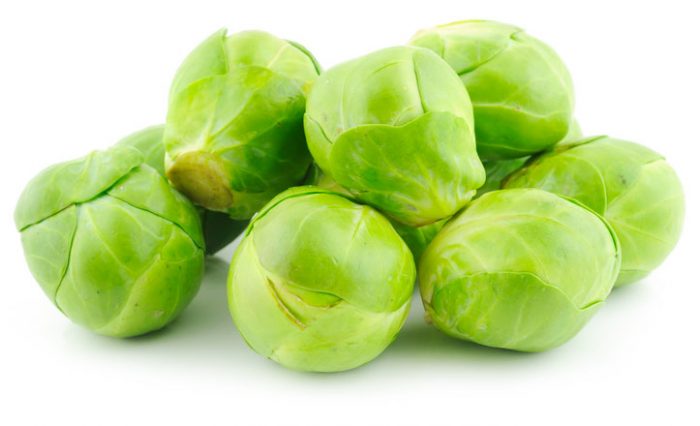
Written By: Christina Newberry
Reviewed By: Gloria Tsang, RD
Title: Registered Dietitian
Last Updated on:

Brussels sprouts tend to bring out strong opinions: You either love them or you hate them. If you love them, you’re in luck – these tiny cabbages are packed with nutrition. As a bonus, they thrive in colder temperatures, so they’re at their peak when there are few other fresh, local produce options available. If you’ve always thought you hated them, you just might want to give them another chance. Brussels sprouts are enjoying a moment in the spotlight, which means there are all kinds of new ways to prepare them. These new methods might just be tasty enough to make you forget all about those childhood dinners of overcooked, mushy “little brains.”
Table of Contents
100 grams of boiled and drained Brussels sprouts (~ 5 sprouts) provides:

Brussels sprouts are high in fiber, which can help lower cholesterol, and folate, which can help lower homocysteine – a risk factor for heart disease. Plus, they’re a good source of lutein, which appears to reduce the risk of stroke and heart disease. They also contain compounds that reduce inflammation in the body, and in the cardiovascular system in particular. However, if you are taking anticoagulants, you should be careful about eating too many Brussels sprouts. They contain Vitamin K, which promotes blood clotting and can reduce the effectiveness of anticoagulant medications.
Brussels sprouts contain phytonutrients that promote apoptosis, a process that kills pre-cancerous cells. They are also a good source of sulforaphane, a phytochemical that has been found to detoxify cancer-causing chemicals before they damage the body, and they are loaded with antioxidants. They have been shown in particular to help ward off colon, bladder, breast, and prostate cancers.
Brussels sprouts are packed with vitamins, including Vitamins A, C, E, and K, as well as several B vitamins.
Look for bright green sprouts with no mushy or brown spots. They should be round (not elongated), with tightly packed leaves. Go for sprouts that seem heavy for their size. Smaller sprouts are sweeter – so go for these if you have any doubts about your love for these sprouts!
Alumni: University of Victoria – Christina Newberry is a writer and editor whose work has appeared in national and local magazines and newspapers. With a Bachelor’s degree in English and Anthropology from the University of Victoria and a Journalism Certificate from Langara College, Christina brings keen curiosity and the love of a good story to her work with HealthCastle.com.
Christina is a passionate traveler and urban gardener with an interest in vegetarian eating and making good, tasty food from scratch. Sharing lessons learned from her own experiences, Christina writes about lifestyle topics for HealthCastle, with a focus on eating well at home and on the road.
brussels sprouts, cholesterol, fiber, grocery aisle, healthy every month, heart smart, vegetables
would brussel sprouts be as effective as green cabbage as anti-cancer properties, or the same?
Thanks,
Jeff